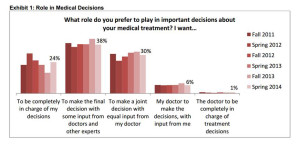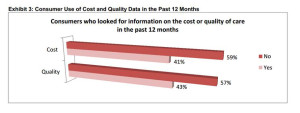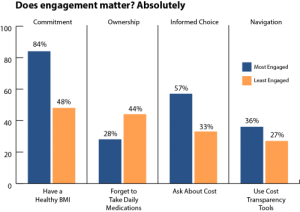 3 in 5 people in the U.S. would like to take the lead on making medical decisions for themselves, according to the Altarum Institute Survey of Consumer Health Care Opinions, Spring 2014 edition, published July 2014. Another 30% of people want to make a joint decision with equal input from their doctor.
3 in 5 people in the U.S. would like to take the lead on making medical decisions for themselves, according to the Altarum Institute Survey of Consumer Health Care Opinions, Spring 2014 edition, published July 2014. Another 30% of people want to make a joint decision with equal input from their doctor.
Together, the math calculates to 9 in 10 Americans seeking major roles in medical decisions.
Altarum’s survey paints a picture of consumers looking to take charge in health care, seeking information about symptoms and clinical issues. 7 in 10 people look up health information before seeing their doctor, 8 in 10 people have looked online to self-diagnose a health symptom, and 4 in 10 people prepare a list beforehand and make sure to get their questions answered. 
But while most of these health consumers are concerned about paying unexpected medical bills and are comfortable asking clinicians about costs, only 4 in 10 have sought information on the cost or quality of care in the past year.

Altarum notes that the gap between concern about health costs and actions to seek information on them might signal a “lack of confidence” with only one-third of people believing they have the ability to shop for better prices.
That confidence helps bolster peoples’ engagement in their health. The more engaged a health consumer is, Altarum found, the more likely they will look up symptoms online before seeing a doctor, as well as learning about the health condition themselves. Lower health engagement leads to more people seeing a doctor first without seeking out information on their symptoms. And lower engagement also leads to more people going to the doctor later than they believe they should have.
Altarum surveyed 2,099 U.S. online adults between 18 and 64 years of age in March 2014. The sample was 58% female, 42% male. 
Health Populi’s Hot Points: The health confidence gap is getting in the way of peoples’ full-on health engagement. Altarum’s Consumer Engagement measure (ACE) gauges 4 factors of activation:
- Commitment (“I can stick with plans to exercise and eat a healthy diet”)
- Ownership (“my health is my responsibility, not someone else’s”)
- Informed choices (“I feel comfortable talking to my doctor about my health”), and
- Navigation (“When choosing a new doctor, I look for information online”).
As the last chart illustrates, greater health engagement yields better health outcomes including a healthy BMI, better medication adherence, and more frequently asking about health costs and using transparency tools. These latter two actions are part of personal health-financial engagement.
Financial wellness is also part of overall health and wellness. Altarum’s data clear demonstrate the ROI on health and patient engagement. People want to be in charge and engaged for both medical and health financial decisions, but still lack usable on-ramps to doing so.




 I'm in amazing company here with other #digitalhealth innovators, thinkers and doers. Thank you to Cristian Cortez Fernandez and Zallud for this recognition; I'm grateful.
I'm in amazing company here with other #digitalhealth innovators, thinkers and doers. Thank you to Cristian Cortez Fernandez and Zallud for this recognition; I'm grateful. Jane was named as a member of the AHIP 2024 Advisory Board, joining some valued colleagues to prepare for the challenges and opportunities facing health plans, systems, and other industry stakeholders.
Jane was named as a member of the AHIP 2024 Advisory Board, joining some valued colleagues to prepare for the challenges and opportunities facing health plans, systems, and other industry stakeholders.  Join Jane at AHIP's annual meeting in Las Vegas: I'll be speaking, moderating a panel, and providing thought leadership on health consumers and bolstering equity, empowerment, and self-care.
Join Jane at AHIP's annual meeting in Las Vegas: I'll be speaking, moderating a panel, and providing thought leadership on health consumers and bolstering equity, empowerment, and self-care.